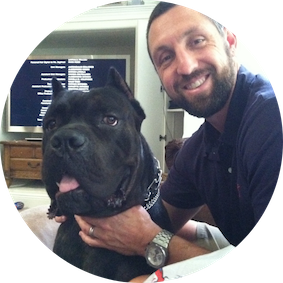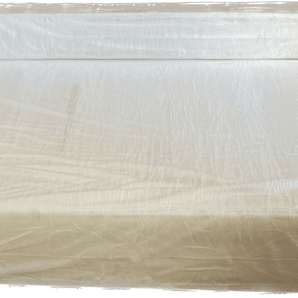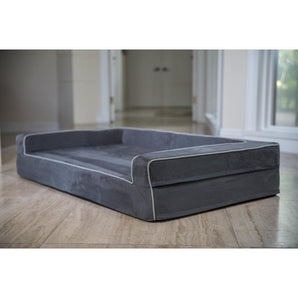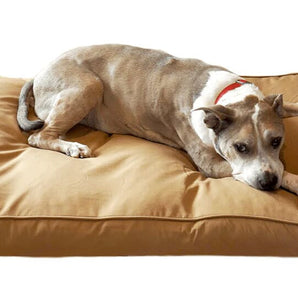Dogs have many habits that might puzzle their human companions, and paw chewing is one of the most common. When your furry friend is constantly chewing their paws, it can be both concerning and frustrating. Dogs lick and chew their paws for a number of reasons, and understanding the reasons behind this behavior can help you identify the underlying issue and ensure your dog's health and well-being.
Why do dogs chew their paws? Here are 10 reasons you may notice your dog licking or chewing their paws:
-
Allergies
-
Parasites
-
Skin Infections
-
Injury or Pain
-
Anxiety and Stress
-
Boredom
-
Dry Skin
-
Nutritional Deficiencies
-
Hormonal Imbalances
-
Foreign Objects
Is Your Dog Chewing On Their Paws?

Does your dog chew or lick his paws? Seeing your dog licking and chewing their paws excessively can be distressing. Not only is it uncomfortable for your pet, but when dogs lick or chew too much, it can also lead to secondary problems like infections and skin damage. If your dog is engaging in this behavior, make sure to observe their habits closely so you can figure out what might be contributing to the issue.
Reasons Why Dogs Chew and Lick Their Paws

1. Allergies
Allergies are one of the most common reasons for chewing and paw licking. An allergic reaction can be triggered by allergens such as certain foods, pollen, dust mites, and chemicals found in household products. When a dog is exposed to an allergen, their immune system reacts by releasing histamines, which can cause itching and irritation in various parts of their body, including their paws.
Food allergies are frequently behind excessive paw licking and chewing. Common allergens include beef, dairy, wheat, and chicken. If you suspect your dog is having an allergic reaction to their food, it might be worth discussing an elimination diet with your veterinarian to identify and remove the triggering ingredient from your dog's diet.
2. Parasites
Parasites such as fleas, ticks, and mites can cause significant discomfort for dogs, leading them to chew and lick their paws excessively. Flea bites can cause intense itching and irritation, especially if your dog is allergic to flea saliva. Ticks can also cause localized irritation around dog paws, and mites, such as those responsible for mange, can lead to severe skin conditions.
Regular flea and tick prevention treatments can help keep parasites at bay. If you think your dog may have mites, a trip to the vet is necessary for proper diagnosis and treatment. You should also make sure to wash all their bedding and use a waterproof bed cover to ensure mites, fleas, and ticks aren't burrowing in their bedding. In all cases, addressing the parasite issue right away can prevent further discomfort and complications for your dog.
3. Bacterial and Yeast Infections
Skin infections such as a bacterial or yeast infection are another common reason for dogs chewing their paws. Bacterial infections can develop when there are open wounds or scratches on your dog's skin, providing an entry point for bacteria. These infections can cause redness, swelling, and itching, prompting your dog to chew and lick the affected area.
Yeast infections, a type of fungal infection, often occur in moist areas like between the toes. These infections can cause a distinctive musty odor and lead to persistent itching and discomfort for your pet. Treatment for skin infections typically involves topical or oral antibiotics for bacterial infections or antifungal medications for yeast infections. Regularly using antifungal wipes on your dog's paws can help prevent infections from happening.
4. Injury or Pain
Sometimes, dogs chew their paws in response to injury or pain. This could be due to a cut, blister, or foreign object like a splinter lodged in their paw pad. Even minor injuries can cause significant discomfort and lead to persistent licking and chewing as your dog tries to alleviate the pain.
Inspect your dog's paws regularly for signs of injury. If you notice any cuts, swelling, or foreign objects, address the issue promptly. In some cases, a visit to the veterinarian may be necessary to properly treat the injury and prevent infection.
5. Anxiety and Stress
Just like humans, dogs can experience anxiety and stress, which can manifest in various ways, including excessive chewing and licking of their paws. Common sources of anxiety in dogs include separation anxiety, changes in their environment, or exposure to loud noises. In these cases, paw chewing can be a coping mechanism to self-soothe.
Addressing anxiety and stress in dogs often involves a combination of behavioral training, environmental changes, and sometimes medication. Providing your dog with a safe, comforting space and ensuring they get plenty of physical and mental stimulation can also help reduce anxiety-related behaviors.
6. Boredom
Boredom is another frequent cause of paw chewing in dogs. When dogs don't get enough mental and physical stimulation, they may resort to chewing their paws as a way to pass the time and alleviate boredom.
Make sure your dog gets plenty of exercise and mental stimulation in order to prevent boredom. Interactive toys, regular walks, and engaging activities like puzzle games can help keep your dog entertained and reduce the likelihood of them chewing their paws out of boredom.
7. Dry Skin
Dry skin can be caused by a variety of factors, including low humidity, harsh weather conditions, and certain dietary deficiencies. When a dog's skin becomes dry, it can lead to itchy paws, prompting them to chew and lick in an attempt to relieve the irritation.
To help manage dry skin, feed your dog a balanced diet rich in essential fatty acids, which promote skin health. You can also use a humidifier in your home and provide your dog with moisturizing shampoos and conditioners to help alleviate dryness and reduce paw chewing.
8. Nutritional Deficiencies
Nutritional deficiencies can have a significant impact on your dog's skin and coat health. Deficiencies in essential nutrients such as omega-3 and omega-6 fatty acids, vitamins, and minerals can lead to dry, itchy skin and a dull coat, making your dog more prone to excessive chewing and licking.
Ensuring your dog receives a balanced diet that meets all their nutritional needs will help in maintaining healthy skin and coat. If you suspect your dog may have a nutritional deficiency, consult with your veterinarian to discuss potential dietary adjustments or supplements that may be beneficial.
9. Hormonal Imbalances
Hormonal imbalances, such as hypothyroidism, can also lead to dogs chewing on their paws. Hypothyroidism occurs when the thyroid gland does not produce enough thyroid hormone, leading to a range of symptoms including dry, itchy skin, hair loss, and weight gain. Dogs with hormonal imbalances may chew their paws in response to the discomfort caused by these skin issues.
If you suspect your dog has a hormonal imbalance, schedule a visit with your vet for proper diagnosis and treatment. Hormonal imbalances are typically managed with medication, which can help alleviate symptoms and reduce paw chewing.
10. Foreign Objects
Foreign objects such as small stones, thorns, or pieces of glass can become lodged in your dog's paw pads, causing discomfort and leading to chewing and licking. Even small debris can cause significant irritation and pain, prompting your dog to chew their paws in an attempt to remove the object.
If you notice your dog chews on their paws more than normal, the first thing you should do is inspect their paw pads and remove any debris you come across.
How to Address Your Dog Chewing Paws

Identifying the cause of your dog's paw chewing is the first step in addressing the behavior and ensuring your dog's health and comfort. Start by watching your dog's habits and looking for any patterns or triggers that may be contributing to the paw chewing. Sometimes, the fix can be as simple as removing a foreign object or alleviating boredom.
If neither of those things works, consult with your veterinarian for assistance with diagnosing and treating the root cause of paw chewing. Your vet can perform a thorough examination, conduct necessary tests, and recommend appropriate treatments based on their findings. This might include dietary changes, medications, or behavioral interventions, depending on the specific cause.
In addition to veterinary care, there are several things you can do at home to help manage paw chewing. Regular grooming can help prevent and identify issues early on. Additionally, make sure your dog has a balanced diet, adequate exercise, and mental stimulation—these things can also go a long way in maintaining their overall health and reducing the likelihood of excessive paw chewing. If you've ruled out all medical causes and allergic reactions, you can also use a no-chew spray to discourage chewing paws.
If you're ever unsure about the cause of your dog's chewing or how to address it, don't hesitate to seek advice from your veterinarian. They can provide the guidance and support needed to keep your furry friend happy and healthy.





